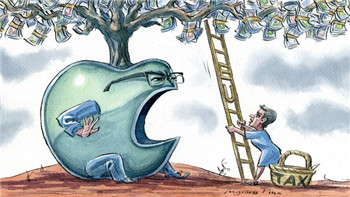
Here’s to the crazy ones. The misfits. The rebels. The troublemakers. The round pegs in the square holes. The ones who see things differently. They’re not fond of rules.
1997年苹果(Apple)在其《非同凡“想”》(Think Different)电视广告中赞颂道:“向疯狂的人们致敬。向格格不入的人们、向离经叛道的人们、向惹是生非的人们、向方孔中的圆形螺丝、向以不同视角看问题的人们致敬。
And they have no respect for the status quo,” ran the eulogy of Apple’s Think Different television advertisement in 1997. In the same spirit, here’s to Margrethe Vestager.
他们不喜欢墨守成规,他们也不愿安于现状。”以同样的精神,我要向玛格丽特•维斯特格(Margrethe Vestager)致敬。
The EU competition commissioner insists she is not deliberately making trouble by deciding this week that Ireland should levy Euro13bn in taxes that it allowed the company to underpay over a decade.
这位欧盟反垄断专员本周认定,爱尔兰应该向苹果征收130亿欧元的税款,这是十多年来爱尔兰让苹果少交的税。维斯特格坚称,她这一决定不是在故意找麻烦。
“No rules have been changed — not one,” she retorted to the accusation that she is ripping up international tax treaties and diverting US tax revenues to Europe. She looked unperturbed by the rumpus.
对于有关她在撕毁国际税务协议并将属于美国的税收引至欧洲的指控,她反驳称:“没有任何规则被更改了——一条也没有。”看起来此事引起的争议并未让她不安。
Ms Vestager seems to have taken lessons from Apple about presentation. Her original 2014 complaint against the company was jammed with details. This week’s update was pared down and clean, making the argument simply.
维斯特格似乎已从苹果那里学习了关于表达方式的技巧。她2014年对苹果最初的投诉满纸细节。而本周的更新版本则篇幅大减,非常简洁,简单地陈述了论点。
Steve Jobs might have appreciated the elegant Danish design, although the content infuriated the US and Irish governments — and Tim Cook, Jobs’s successor as Apple chief executive.
史蒂夫•乔布斯(Steve Jobs)没准会欣赏这种优雅的丹麦表达,尽管她所说的内容激怒了美国和爱尔兰政府——以及接替乔布斯担任苹果首席执行官的蒂姆•库克(Tim Cook)。
Its simplicity is both a weakness and a strength. The weakness is that it is hard to believe it will hold up in court, where the argument is heading.
这种简洁既是弱点,也是优势。其薄弱之处在于,很难相信它在将要走向的法庭上能够站得住脚。
There is something a bit too neat about the way Ms Vestager sliced through the Gordian knot of transfer pricing and tax residency with one stroke by declaring Apple’s three-decade-old arrangements with Ireland invalid.
维斯特格宣称苹果与爱尔兰之间长达三十年的制度安排无效,一举突破了转移定价和纳税居地这个复杂的戈尔迪之结,不过这种快刀斩乱麻的方式有些太过简单化了。
Corporate tax is a complex matter: intellectual property can be moved to offshore locations and exploited at arm’s length according to intricate related-party formulas; sales in one country can become revenues in another; US companies can invert themselves to somewhere else.
公司税是个复杂的问题:知识产权可以转移至国外,并依照复杂的关联方安排,方便地取用;在一国的销售可能会变成在另一国的营收;美国企业可能会将自身“倒置”到其他地方去。
If any tax arrangement that beats others can be outlawed as selective state aid, a lot of tax lawyers are out of work.
如果任何优越的税务安排都可被认定为选择性政府补助、因而非法,许多税务律师就失业了。
Ms Vestager’s strength is that none of that makes much sense, or feels justifiable, to individual taxpayers.
维斯特格的优势则在于,在单个的纳税人看来,上述这些都不怎么合理,感觉上也不怎么正当。
“If my effective tax rate would be 0.05 per cent, falling to 0.005, I would have felt that maybe I should have a second look at my tax bill,” she said. Apple insists that it paid $400m in taxes in Ireland in 2014, but her rhetoric was powerful.
维斯特格说:“如果我的有效税率原本是0.05%,它降到0.005%时,我会感觉自己是不是看错了税单。”苹果坚称2014年它在爱尔兰支付了4亿美元税款,然而维斯特格的说法十分有力。
Apple sounded quite flustered as it protested that things are not as they appear. On tax matters, it resembles the nerdy PC character in its “Get a Mac” campaign in the 2000s, with Ms Vestager as the cool, cocksure Mac.
苹果抗议称事实并不像表面看上去的那样,这话显得它很心慌。在税务问题上,苹果就像2000年代的《买台Mac》(Get a Mac)系列广告中代表个人电脑(PC)的那个呆头呆脑的角色,而维斯特格则像代表Mac的那个酷酷的、自信满满的角色。
The more it explains that it has deferred taxation, not avoided it, the more conventionally corporate it looks.
苹果越是解释它是推迟、而非逃避了纳税,它看起来就越像一家传统企业。
Its tax challenge is straightforward enough, and is common to a lot of US companies. It produces most of its value — its intellectual property and distinct approach to technology and design — in California.
它面临的税务挑战非常简单,对许多美国企业也十分常见。苹果的多数价值(它的知识产权以及它在技术和设计上的独特思路)都是在加利福尼亚州创造的。
Under existing global tax treaties, it could legitimately channel most profits from around the world back to the US through royalty fees on overseas sales.
按照现有的全球税收协议,它可以通过对境外销售收取的许可费,合法地将其在世界各地获得的大部分利润转移回美国。
It does not want to do this because that would involve paying up to 35 per cent tax in the US on the profits compared with Ireland’s 12.5 per cent rate.
然而,苹果不想这么做,原因是这么做意味着这些利润要在美国缴纳最高达35%的税款,相比之下在爱尔兰只需缴纳12.5%。
The simple answer, as Ms Vestager points out, would be to pay the latter instead; Apple is structured so it could easily do so. Its Irish subsidiaries hold royalty rights for European sales and most profits flow there.
正如维斯特格所指出的,按照后一种税率缴税是很容易得出的答案。苹果的结构让它可以轻而易举地这么做。它在爱尔兰的分公司持有欧洲销售的许可权,这样多数利润就流向了那里。
But Ireland used to offer a twist: the right to form companies that were not tax resident there or in the US. Rather than pay taxes immediately, Apple could defer them under US tax law.
不过,爱尔兰也曾经提供了可乘之机,让既非爱尔兰纳税居民也非美国纳税居民的公司得以成立。按照美国税法,苹果可以不用马上缴纳税款,而是过后缴纳。
Hence its anger about being accused of tax dodging: where others see billions in unpaid Irish taxes, Apple and the US government see future US ones. Apple is not, overall, an aggressive tax avoider: it paid $19.1bn in taxes last year.
这正是苹果被谴责避税后愤怒的原因:在其他人眼中数十亿未缴纳的爱尔兰税款,在苹果和美国政府看来却是未来将交给美国的税款。总体上说,苹果并不是激进的避税者:去年该公司缴纳了191亿美元的税款。
It is not quite so simple, though. Apple has made provisions for deferred US taxes on about half of the $215bn in cash and equivalents it held overseas in 2015.
不过,事情并没有这么简单。苹果已为其将延迟向美国缴纳的税款做了拨备,这些税款对应的是该公司2015年在海外持有的2150亿美元现金及现金等同物的约一半。
It is waiting for the US tax rate to fall before it repatriates this money to shareholders, but this could be a long time. It may never send back the rest: US companies often reinvest overseas cash in growth or acquisitions.
苹果打算等美国调低税率后,再把这笔资金转回到股东手上。然而时间可能会很长。剩余部分苹果可能永远都不会转回来:美国企业经常会把在境外的现金再次投资,用于企业增长或收购。
US corporate taxation is especially peculiar and hard to grasp and is painfully dysfunctional. The US government keeps on trying to pass tax reforms, and the details of Apple’s Irish tax structures first emerged publicly during a Senate committee investigation three years ago.
美国的公司税制特别古怪和令人费解,毛病很大。美国政府一直试图通过税务改革法案。苹果在爱尔兰的税务结构的具体情况,是三年前在一项参议院委员会的调查中首次公开的。
The Senate identified US companies’ overseas cash as a tax target for the US not the EU.
美国参议院当时确认,美国企业在美国境外的现金,由美国而不是欧盟(EU)征税。
Enter Ms Vestager, with her plan to make Ireland retrieve Euro13bn, and to let other EU countries stake their own claims to the money.
维斯特格登场了。她的计划是让爱尔兰收回130亿欧元税款,让其他欧盟国家声索对这笔钱的所有权。
Since no one else moved, she gained first mover advantage, and state aid law has given her extraordinary legal powers. It is an audacious, revolutionary and surprising move, but that was Jobs’s style too.
由于其他人没有行动,她取得了先发制人的优势,而国家援助法赋予了她惊人的法律力量。这是个大胆、革命性又令人惊异的举动,不过这也是乔布斯的风格。
Her boldness will change the rules of global taxation if it survives the legal challenges. Bill Gates, Microsoft co-founder, used to get irritated that Apple was hipper than his own company but arguing with public opinion got him nowhere. In Ms Vestager, Apple faces a cool opponent.
如果能经受住相关法律挑战的考验,维斯特格的大胆举动将改变全球税收的规则。微软(Microsoft)联合创始人比尔•盖茨(Bill Gates)曾经为苹果比微软酷而愤慨,然而他争不过舆论。在维斯特格这里,苹果遇到了一个酷对手。












